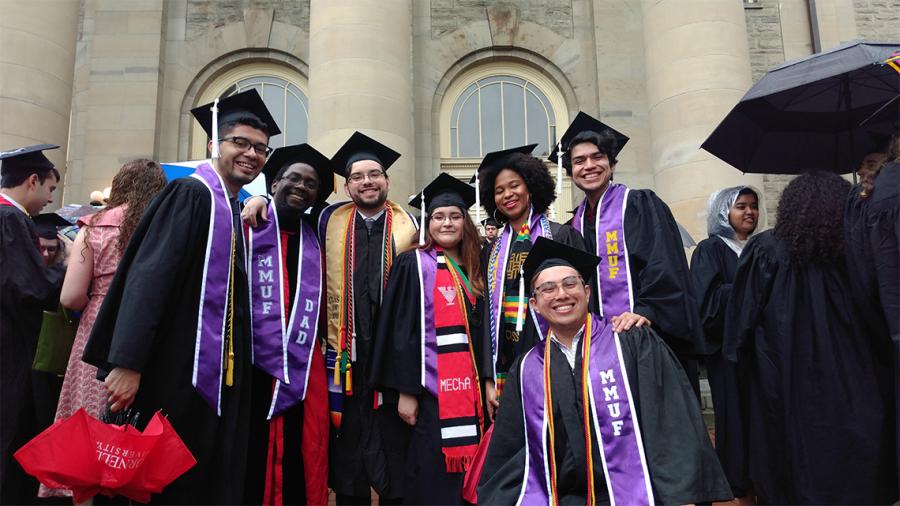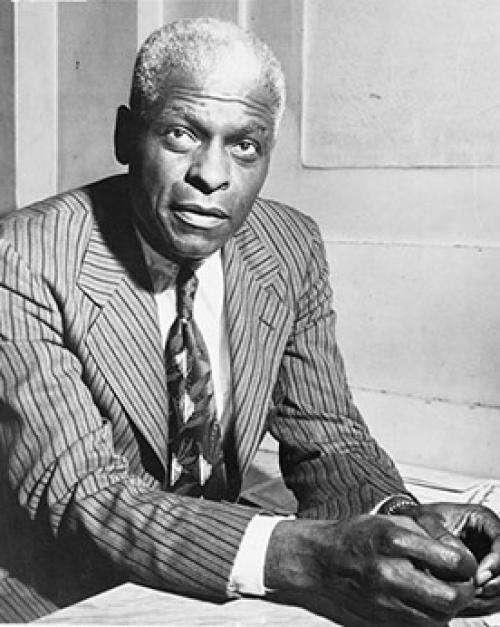Creating pathways to the US academy and shaping the future of the humanities
Established in 1988, the Mellon Mays Undergraduate Fellowship (MMUF | Mellon Foundation) is committed to broadening the range of scholarly perspectives in the US academy, with a focus on the humanities and the humanistic social sciences. Its name honors Dr. Benjamin E. Mays, the noted African American educator, statesman, minister, former president of Morehouse College, and mentor to Dr. Martin Luther King, Jr.
Each year, new MMUF undergraduate fellows are selected from applicants in the rising junior classes of MMUF member institutions. These fellows join the rising and graduating senior fellows. The MMUF fellows are provided with mentoring and financial support as they prepare for entry into PhD programs and eventual careers as scholars and faculty members.
Founded with an initial cohort of eight member institutions, the program has grown to include 47 programs, including three consortia. Nationally, the MMUF program has produced more than 1,200 PhDs. Over 800 are currently college professors, and many have taken their humanities training into venues ranging from museums to nonprofit organizations to publishing houses to government positions. At any given time, about 800 MMUF fellows are enrolled in PhD programs. The national fellowship supports approximately 500 undergraduate students each year.
Core Components
Research: Each undergraduate fellow is required to conduct an individual research project under the guidance of a faculty mentor. Guided research is a foundation of MMUF and provides the opportunity to prepare for advanced scholarly work.
Mentoring: Each Mellon fellow is paired with a faculty mentor, with whom they are expected to meet on a regular basis. Students work with their mentors to develop their scholarly interests into research directions.
Meetings/Workshops: During our two meetings per month, students come together to present their research, exchange ideas and discuss various topics related to academic life and preparation for graduate school. Workshops are conducted on topics such as taking the GRE, writing and research, presenting at academic conferences and applying to graduate school.
Conferences and Publication: Fellows will attend and present their research at the MMUF annual conferences. Conference attendance provides invaluable professional development and networking experience. Fellows are also encouraged to submit their research papers for publication in the Mellon Mays Undergraduate Fellowship Journal.
Research Prize: Fellows receive funding during the academic year to allow more time to focus on their academic work and research. Summer funds are also awarded for research and research-related travel.
Eligibility
- Enrolled in the College of Arts & Sciences
- Demonstrate academic promise
- Maintain Good Academic Standing
- Admitted to a major in a designated field
- Demonstrate interest in pursuing extensive research in an eligible field
- Demonstrate commitment to the goals of MMUF
- Availability for, and commitment to, full and enthusiastic participation in all aspects of the MMUF program, including attendance and participation at conferences and meetings
- U.S. citizens, including students who attended and graduated from a U.S. high school without U.S. citizenship, residency, or visa status
Designated Fields
- Anthropology
- Area/Cultural/Ethnic/Gender Studies (including FGSS, CAPS, Africana, Latinx, Asian, Jewish, and Near Eastern Studies)
- Classics
- History
- History of Art
- Languages other than English
- Linguistics
- Literatures in English or Comparative Literature
- Musicology, Ethnomusicology, or Music Theory
- Performing and Media Arts (theoretical focus)
- Philosophy and Political Theory
- Religious Studies
- Sociology (qualitative)
*Please note: this program is not designed to prepare students for professional careers in fields such as law, medicine, or finance.
Important Dates and Forms
Applications for the Spring 2026 cycle are now open. Submit your application here. Applications are due March 25, 2026.
MMUF Info Sessions:
Interested in learning more about the program? Join us on March 2nd, 2026, at 5pm in Rockefeller 429. Interested A&S students will have a chance to meet program staff and current Mellon Fellows.
You may also be nominated to apply by a Cornell faculty member or your Advising Dean. If so, you’ll receive a letter encouraging you to apply to the program. When applying, you will be asked to fill out an application that requires academic references and two essays.
Links to additional forms:
- Loan repayment form (for fellows currently in graduate school)
Program Contacts
Mary Pat Brady
Professor, Department of Literatures in English
Faculty Director, Cornell's Mellon Mays Undergraduate Fellowship Program
Faculty Director, American Studies Program
Monique Staats
Advising Dean, College of Arts & Sciences
Administrative Director, Cornell's Mellon Mays Undergraduate Fellowship Program
For program inquiries, please email mmuf@cornell.edu.
About Benjamin Mays
Benjamin Elijah Mays (1895-1984) was an educator, college president, and civil rights activist. His tenacious stand against racial discrimination and broad social vision inspired Martin Luther King, Jr.; his commitment to education earned Mays 49 honorary degrees. Read more about Benjamin Mays.

